- Home
- Peter Benchley
The Girl of the Sea of Cortez: A Novel Page 2
The Girl of the Sea of Cortez: A Novel Read online
Page 2
Paloma turned away.
Her father had explained the problem to her many times, during those early days when she had first complained about the young men who fished without care, taking everything and wasting much. “The sea, this sea, is too rich,” he had said. “It has too much life.”
She had not understood.
“If fish were in short supply here, fishermen might fish with care, in self-defense, for fear of killing off their livelihood. But here,” Papa said, “nature seems to be showing off, proving to us how rich it can be. There is so much here, people see no reason to be careful. One day they will, but by then it may be too late. For now, it is all there to take.”
Paloma had loved the sea since the time of her earliest memories. Her father, Jobim, had recognized the affinity between his first-born child and the sea, and had determined to nourish it. When she was a baby, he had bathed her in the sea and taught her to float, and then to swim, and to fear few living things but to respect them all.
And he had captivated her with his descriptions of the things that made their sea, the Sea of Cortez, unique.
The Sea of Cortez itself, he said, existed because of an ancient accident. Ages and ages ago, the peninsula known as Baja California had been part of the Mexican mainland. Then, at some point in prehistory, the plates that fit together to make the earth’s surface had realigned themselves and caused what must have been the most spectacular earthquake of all time.
“You know how you take an old, ratty shirt and tear it up the back to make rags?” Jobim had said. “That’s what happened to Mexico. It split along its main seam, the San Andreas Fault. And when the seam split there was a big space, and the Pacific Ocean rushed in, and a new sea was born.”
The sea had had no name then, of course. Jobim read to her from a book that said it was not until 1536 that the sea was named for the Spanish explorer Hernando Cortez, who discovered Lower California and the sea that separated it from the Mexican mainland.
“Isn’t that funny?” he had said. “Doesn’t that make you laugh?”
“What?” Paloma wanted very much to share the laugh, but she didn’t understand. “What’s funny?”
“That they say some Spaniard discovered this place. Your ancestors were here, living and farming and fishing, when the Spaniards were still living in caves and eating bugs. All Cortez did was kill people and go on his way.” Papa shook his head. “And for that they named the sea after him.”
One book even credited Cortez with naming all of California. According to the story, as they cruised north along the west coast of the American continent, the Spaniards suffered badly from the heat. At one point, Cortez was supposed to have remarked, in Latin, to one of his officers that he found the region to be stinking hot, as hot (calidus) as a furnace (fornax).
“Nowadays,” Jobim had said, “some people don’t call it a sea anymore. They call it a gulf, the Gulf of California. But it doesn’t need a name. It is the sea. There are three things that make up life here: the sea, the land, and the people. They don’t need names to separate them.” He had smiled. “If you can’t tell the difference, life won’t be easy for you.”
So to Paloma, it was, simply, the sea—provider and friend but also tormentor and enemy. For if it gave her most of what she loved in life, it had also taken from her the one thing that she had cherished most in life.
Because of its peculiar combination of mountains and water, extreme dryness and extreme humidity, Pacific Ocean winds and high sierra winds, the Sea of Cortez was a breeding ground for sudden, violent low-pressure weather systems. With no warning at all, a fine day on the sea could turn mean. Over the horizon would race a black swirl of clouds. Beneath and before the clouds, the calm sea would begin to churn. At first, there would be a sound like a distant whisper, but soon it would swell into a horrid, wailing roar.
They were called chubascos, and unlike hurricanes and typhoons, they did not come from anywhere: They were created right there, and they lived and died right there. So, even if you had a radio, you could not hear a weather forecast about a chubasco approaching.
If you were lucky and were on land, you could fling yourself into a ditch or into the lee of a hill.
If you were unlucky and were on the water, you hoped to be able to notice a few early signs—even one sign, like a subtle shift in the wind or the sudden formation of a tower of black clouds—that would give you time to run for a lee or, at least, to reach open water, where you could face the pounding waves without fear of being driven onto a rocky shore.
If you were so unlucky as to be underwater when the first signs formed, and did not see them until the storm had made up and was almost upon you, and were forced to scramble aboard your boat and start your motor and free your anchor—then all that was left to you was prayer. Sometimes it worked; sometimes it didn’t.
Two summers before, after the terrible “chubasco of the full moon”—the moon was full and the tides were very high, which meant that the storm-driven water rose higher and did more damage—he was found, drowned, washed up on the beach of a nearby island.
That was one reason Paloma tended to question the acceptance, by Viejo and others, that everything mysterious was somehow an integral part of God’s master plan.
If anyone or any thing or any force had deliberately willed or caused her father’s death, that something would be the focus of her hatred till the day she died. She believed, rather, that Papa’s death was an accident, a random blow, something that nothing had ordained or could have prevented. She had conditioned her mind not to think beyond that, about what might lie behind randomness or luck.
At supper that evening, Jo insisted on describing in detail, for Paloma and their mother, each of the triumphs of his day at sea.
He boasted about how many fish they had caught, about how hard the grouper had fought, about how sharks had swarmed around his boat and tried to steal his catch.
Paloma sat silently, knowing that for her to comment could lead only to argument. But Miranda, their mother, smiled and nodded and said, “That’s nice.”
With a glance at Paloma, Jo said, “I even threw my iron at a manta ray, a giant devilfish. He dodged at the last second and I missed. But then—I swear—he turned and attacked the boat. It’s a good thing I was quick, or I would’ve been rammed and sunk.”
Paloma said quietly, “Manta rays don’t attack boats.”
“This one did. This was a real devilfish. I swear.”
“Why do you want to harpoon a manta ray? They don’t hurt anybody.”
“So you say! The devilfish is evil! That’s why he has horns. He brings the face of evil to the earth.”
Paloma said nothing, making a conscious effort to look only at her bowl of fish soup. But she could not resist—it came almost as a reflex—shaking her head as Papa used to, in a way that manifested contempt.
Jo knew the gesture, recognized its origin, and hated it. And so he started to shout. “What do you know? You think you know so much. You don’t know anything! The devilfish is evil. Everybody knows that. Everybody but you. You don’t know anything.”
Miranda recognized the gesture, too, and could see in it Jobim and the conflict he had unknowingly built up between his children. Frightened, she said, “It’s possible, Paloma. It could be.”
Without looking up from her soup, Paloma said, “No, Mama.”
“Don’t listen to her,” said Jo. “She doesn’t know!” He spat toward the fireplace, the way the men of the island did to show that they had won an argument.
“You may think you know, Paloma,” Miranda said, still hoping to mediate, to placate both her children, to restore peace to the household. “I know there are times when I think I know something, when maybe I just …”
“Mama.” Paloma wanted to stop Miranda’s compassionate rambling. “Let’s leave it.”
For a moment, the room was silent.
Then Paloma raised her eyes and looked into the taut, flushed face of her brother. Th
e arteries on either side of his neck looked as thick as hawsers, and she imagined that she could see them throbbing. His jaws twitched, and his arm—as big around as one of Paloma’s thighs—trembled.
She had wanted to avoid enraging Jo by arguing, and instead had enraged him by being silent—a silence that he interpreted as condescension.
Paloma tried to appear completely calm, confident. She hoped that her eyes did not betray her. She knew for sure that if ever he was driven to act out one of the inner tumults that tortured him, and if she happened to be the object of his fury, he could take her apart as easily as he dismantled one of the engines he so loved to tinker with.
Jo was fifteen, seventeen months younger than Paloma, yet he had the physique of a fully developed adult. From hauling lines and nets since he was a young boy, he had developed massive shoulders and arms. He could not wear a standard shirt, for the muscles in his chest and back burst the seams. From balancing in a tipping boat day after day, his calves and thighs were lined with sinews as tough as wire leader. He was short—five feet six—which suited working in boats, for a low center of gravity made quick, efficient movement easy.
A stranger would not have guessed that Paloma and Jo were siblings, or even distant cousins. She was as lithe as he was compact. She was five feet eight inches tall, and though she had not been weighed in several years, she thought that she weighed about 120 pounds. While Jo looked very much of his people—dark of skin and hair and eyes—she did not. Everything about her was light, from her bones to her skin to her hair, for she was not so much of her people as of her father.
And there, she knew, lay the core of the problem between them. Jo felt that it should be he, not she, who was more like their father. After all, was he not a male? Was his name not made from Jobim’s? And yet every day, what she said, what she did, her entire manner reminded him of how close Paloma had been to Papa and how far—worse, how increasingly far—he himself had been.
Perhaps worst of all, they both knew that Jo had had a chance to be the one close to Papa. When Paloma was feeling kindly toward Jo, she acknowledged to herself that it would have taken a superhuman boy to be the son Papa wanted. What she was less eager to acknowledge was that she, a girl and a kind of son-by-default, had been taught more patiently, forgiven more kindly, praised more freely.
But once the core of enmity had been established between them, almost every other aspect of their relationship seemed to provide new antagonism. There was, for example, Jo’s assumption that upon the death of his father he should become head of the family, an assumption shaken by his knowledge that, while physically capable of almost anything, emotionally he was barely able to take care of himself.
Without another word, Jo rose from the table, turned and left the room.
Miranda looked after him. When he had gone, she turned back and said, “Paloma …”
“I know, Mama. I know.”
First there was only one, rolling and bucking with the grace and precision of a carousel horse, exhaling a wheezy spray through the hole atop its head, its dorsal fin and glossy back shining in the low morning sun.
It crossed in front of her bow, then leaped clear of the water and dived and passed under the boat and rolled again in front.
Then came another, and another, until there were a dozen, and then a score, and then more than she could count.
They crisscrossed ahead of her boat, four and five and six in phalanx, threading together like fingers, then dispersing, to be replaced by other phalanxes on other tacks.
She paddled on, and they came from the rear, leaping along both sides of her boat, as if urging her to gather speed so her boat would make a bow wave for them to ride. But she could make no more than a ripple in the water, so they soared away off to the sides and, in the clicks and chirrups and whistles she could hear clearly, seemed to discuss what game next to play.
They charged her boat in ranks of six and dived beneath it and surfaced on the other side, and in each rank one, only one, would leap over the boat, over her, and as its shadow passed it rained droplets on her head.
She laughed and tried with her voice to duplicate the dolphins’ chirruping sounds, in faint hope that they would think her one of them and would stay with her. But on some secret signal they ceased their frolicking and faced in a common direction and bounded off across the sea.
Paloma stopped paddling, and watched, thrilled. She felt as if she had been anointed by the dolphins: They had chosen her as their playmate in an interlude in their travels.
It was an omen, like seeing the green flash and the jumping marlin. Perhaps today would be a special day.
As usual, Paloma had awakened just before daybreak, when the sun was sending its first gray messengers into the blackness of the eastern sky. She splashed water on her face and crept out of the house and trotted along a path to a tor on the cliffs that faced the east.
To most of the islanders, the tor was a pile of rocks, nothing more. From time to time when one of them needed a boulder of a particular size or shape, he could come and take one from the tor, so by now the pile that had once been symmetrical looked like rubble.
But Viejo had told Paloma that the tor was an ancient burial mound—not for their direct ancestors, but for those who had existed back beyond memory. Once, years ago, some scientists had come up from La Paz and sought permission to dig beneath the tor, but the islanders had refused to give consent, and the scientists had gone away.
“I was young, and eager to see what was under the stones,” Viejo had said, “but the elders said no, and they were right. We believed that the dead beneath the tor looked after us, protected us from something—from what, was a personal matter for each of us. So to let anyone dig it up could only hurt us. If there were bodies under there and if we disturbed them, that could only be bad for all of us. If there were no bodies, our beliefs would then seem wrong, and our faith would be shaken. So we sent the scientists away, grumbling.”
The scientists did, however, leave behind them one small bit of lore which Paloma appreciated. The reason they were confident that the tor was a burial mound, they said, was its location—on the highest point on the easternmost tip of the island. Many ancient peoples believed that they had to be buried facing eastward so they could see the rising sun and benefit from its light. The cruelest thing one could do to a person was to bury him facing westward, for the poor unfortunate was condemned forever to chase the setting sun in search of light.
Knowing this, and more than half believing it, Paloma liked to think that she shared the dawn with the souls of those beneath the tor—especially with her father, who, at his request, had been buried at sea but who also, at Paloma’s insistence, had been buried at the moment of daybreak and facing the rising sun.
Slowly the gray sky was suffused with orange, and then the first shimmering line of fire slipped over the lip of the world.
Paloma sat and watched the sea and tried to envision all the things that were happening below the flat, calm surface. She wished she could watch day break from underwater, for Jobim had told her that it was the time of most activity in the sea, of movement, change, and feeding.
This was true in all seas, he had said, but particularly true in the Sea of Cortez, because here everything seemed to happen at once and in the same places. As an indirect result of the same tremor that had ripped the shirt of Mexico and created the sea, deep-water fish fed in shallow water, animals that normally never saw light were swept up into bright sunlight, and the whole bustle of the sea was concentrated in a few areas. These areas were called seamounts.
Jobim’s knowledge of geology had come from his elders, and from scraps of information gleaned from scientists who stopped occasionally at Santa Maria to study shark specimens. His explanations to Paloma were simple and direct.
Thousands—perhaps millions—of years after the earthquake that created the sea, other shocks and tremors occurred and caused volcanoes to heave up and erupt and, later, to collapse into the sea
. Over the ages, some of them had melded back into the sea bottom, but others remained as seamounts—mountains that rose thousands of feet from the bottom of the sea bed to within fifty or sixty feet of the surface.
The seamounts were a major contributor to the abundance of life in the Sea of Cortez, for they created a kind of natural banquet that attracted animals of every species imaginable.
Deep-water currents that flowed along the bottom of the sea would strike a seamount and create an “upwelling”—the water would rush upward, carrying with it all the microscopic animals (plankton and tiny shrimps and thousands of other creatures) on which larger animals feed. The larger animals would chase their food into shallower water, and they, in turn, would be pursued by the still larger animals that fed on them.
So around a seamount, nature’s whole food chain flourished. “You’ll see everything, Paloma,” Jobim had said before he had taken her diving on a seamount. “Little tiny things that eat great big things, and monsters that eat tiny things; critters that eat plants and critters that eat each other and critters with teeth and critters with filters instead of teeth. And the wonder is, they all get along—even though getting along includes eating one another now and then.”
Now Paloma saw it every day—nature’s display, its spectacular bazaar—and it was always different.
Jobim had eventually introduced her to a seamount all her own, one never visited by the fishermen because they didn’t know it existed. There, only an hour’s paddle from Santa Maria Island, she could spend her days watching and swimming with and, in her fancies, imagining herself to be part of, a rich undersea life.
Each morning after breakfast, she walked down to the dock. She pretended to be there to run errands for the fishermen as they prepared for the day’s journey; in fact, she was there to see them off, to make sure they left before she did, so there would be no chance they could follow her and discover her private place: In a single morning’s fishing they could damage the delicate balance established by nature over countless years.

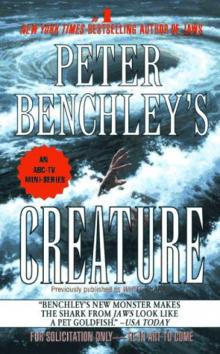 Peter Benchley's Creature
Peter Benchley's Creature The Island
The Island Rummies
Rummies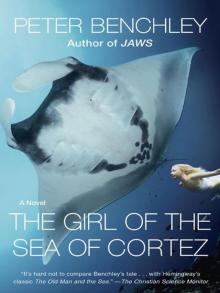 The Girl of the Sea of Cortez: A Novel
The Girl of the Sea of Cortez: A Novel Time and a Ticket
Time and a Ticket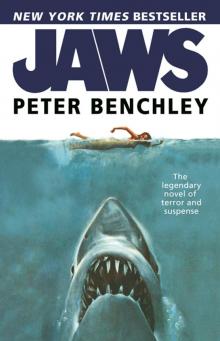 Jaws
Jaws The Deep
The Deep Q Clearance
Q Clearance Shark Trouble: True Stories and Lessons About the Sea
Shark Trouble: True Stories and Lessons About the Sea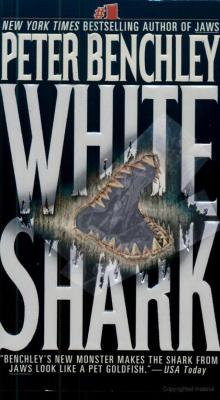 White Shark
White Shark Shark Trouble
Shark Trouble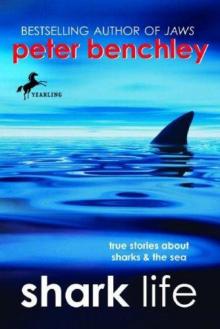 Shark Life: True Stories About Sharks & the Sea
Shark Life: True Stories About Sharks & the Sea